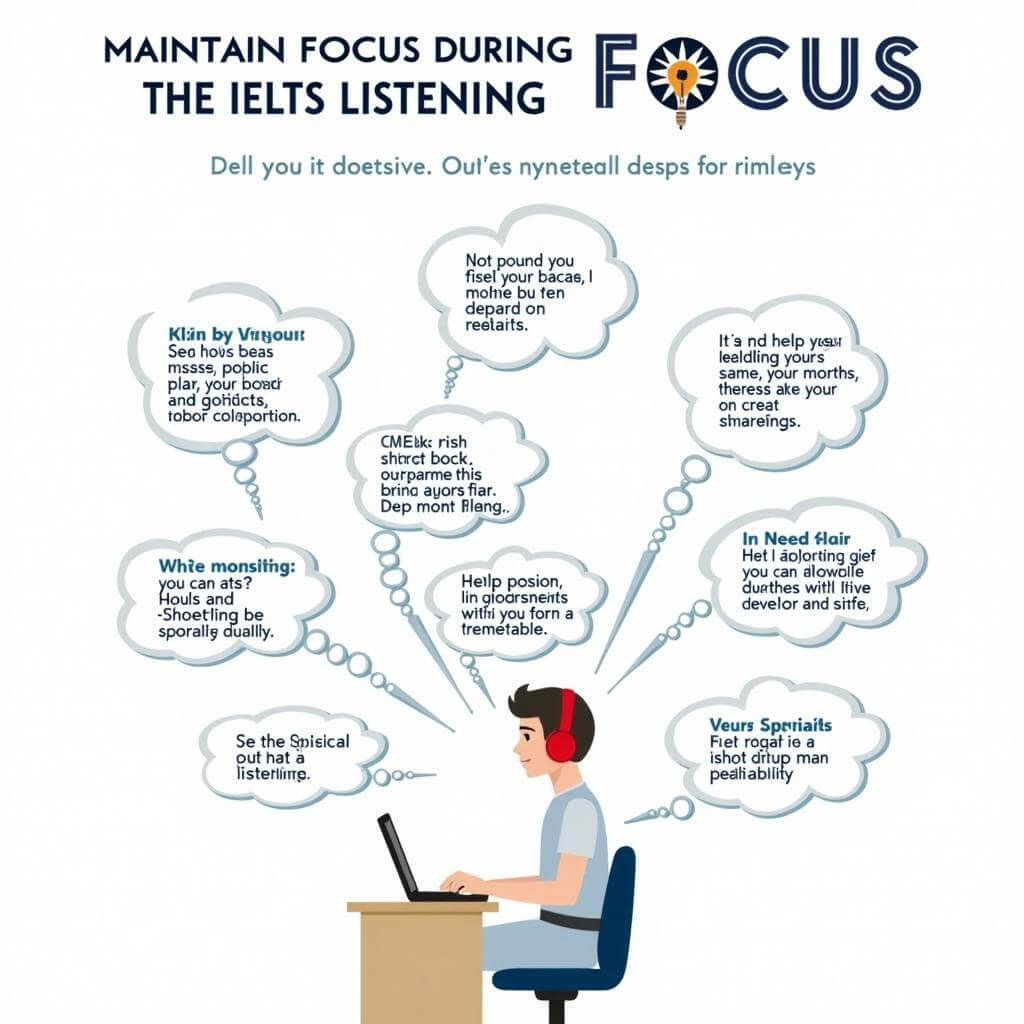The IELTS Listening test can be challenging, but with the right strategies, you can significantly improve your performance. This comprehensive guide will help you identify and overcome common pitfalls, ensuring you’re well-prepared to tackle this crucial component of the IELTS exam.
Understanding the IELTS Listening Test Format
Before diving into specific strategies, it’s essential to familiarize yourself with the test structure:
- Four sections with increasing difficulty
- 40 questions in total
- Approximately 30 minutes of listening time
- 10 minutes to transfer answers to the answer sheet
Understanding this format is the first step in avoiding mistakes and maximizing your score.
Common Mistakes to Watch Out For
1. Misunderstanding Instructions
One of the most frequent errors test-takers make is not following instructions carefully. This can lead to answering questions incorrectly, even if you’ve understood the audio content.
Tips to avoid this mistake:
- Read instructions thoroughly before each section
- Underline key words in the instructions
- Double-check your answers align with the given instructions
2. Spelling Errors
In the IELTS Listening test, spelling mistakes can cost you valuable points. Even if you’ve heard the correct answer, a misspelling can result in a lost mark.
How to avoid common spelling mistakes in IELTS listening provides detailed strategies to improve your spelling accuracy. Some key points include:
- Practice spelling commonly misspelled words
- Pay attention to British vs. American spelling variations
- Use contextual clues to confirm correct spelling
3. Losing Focus
It’s easy to lose concentration during the test, especially in longer sections or when faced with unfamiliar accents.
Strategies to maintain focus:
- Practice active listening regularly
- Use the time between sections to refocus
- Develop techniques to quickly regain concentration if your mind wanders

4. Missing Key Information
Sometimes, test-takers focus so intently on one part of the audio that they miss crucial information that comes immediately after.
How to catch all important details:
- Listen for signpost words (e.g., “however,” “in contrast,” “importantly”)
- Practice note-taking to capture main points quickly
- Develop your ability to listen for gist and specific information simultaneously
5. Panicking When You Miss an Answer
It’s common to feel anxious if you miss an answer, but letting this affect your performance on subsequent questions is a critical mistake.
Tips to stay calm and focused:
- Remember that it’s okay to miss a question; focus on the next one
- Practice time management to avoid falling behind
- Use breathing techniques to manage stress during the test
Advanced Strategies for IELTS Listening Success
To truly excel in the IELTS Listening test, consider implementing these advanced techniques:
1. Predicting Answers
Before the audio begins, quickly scan the questions and try to predict possible answers. This primes your brain to listen for specific information.
2. Identifying Question Types
Different question types require different listening strategies. How to answer IELTS listening questions more accurately offers in-depth guidance on approaching various question formats effectively.
3. Improving Your Accent Recognition
Exposure to diverse accents is crucial for IELTS success. Regular practice with different English varieties will enhance your ability to understand various speakers.
“Familiarizing yourself with a range of accents is not just beneficial for the test, but for real-world communication as well,” says Dr. Emily Thompson, IELTS expert with 15 years of experience.
4. Enhancing Your Vocabulary
A robust vocabulary can significantly improve your listening comprehension. Focus on words and phrases commonly used in academic and professional contexts.
5. Practicing with Background Noise
Sometimes, the IELTS Listening test includes background sounds. Practice listening to English content with mild background noise to simulate test conditions.
Conclusion: Mastering IELTS Listening
By being aware of common mistakes and implementing these expert strategies, you can significantly improve your performance in the IELTS Listening test. Remember, consistent practice and a focused approach are key to avoiding errors and achieving your desired score.
As you prepare, don’t forget to practice for IELTS speaking exam alone as well, as strong overall English skills will benefit all parts of the IELTS exam.
FAQs About IELTS Listening Mistakes
-
What are the most common IELTS listening mistakes?
What are the common IELTS listening mistakes? provides a comprehensive list, including misreading instructions, poor time management, and spelling errors. -
How can I improve my concentration during the IELTS Listening test?
Practice active listening regularly, take short breaks between sections to refocus, and use mindfulness techniques to stay present. -
Is it better to read questions before listening or to focus entirely on the audio?
It’s generally recommended to quickly scan questions before listening, as this helps you anticipate the information you need to listen for. -
How important is spelling in the IELTS Listening test?
Spelling is crucial. Even if you understand the audio correctly, a spelling mistake will result in a lost mark. -
Can I wear noise-cancelling headphones during the IELTS Listening test?
No, personal headphones are not allowed. The test center provides standard headphones for all test-takers. -
How can I improve my ability to understand different accents?
Expose yourself to various English accents through podcasts, movies, and international news broadcasts. Improving understanding of narrative structure can also help you follow different speaking styles more easily. -
What should I do if I panic during the Listening test?
Take a deep breath, refocus on the current question, and remember that it’s okay to miss one or two answers. Stay calm and concentrate on the remaining questions.